By Richard Luthmann
Over a year after Paul Boyne was arrested and extradited from Virginia, Connecticut prosecutors are still scrambling to gather evidence in their case against the controversial family court blogger. Boyne, who has been held in pre-trial detention since July 2023, faces charges of stalking and electronic stalking for allegedly making "true threats" against three Connecticut judges on his blog, TheFamilyCourtCircus.com.
The latest development in the case came in the form of a search warrant, signed by a Connecticut Superior Court judge and prepared by Detective Samantha McCord, a member of the Connecticut State Police and deputized FBI Task Force Officer.
The warrant targets the hosting company of Boyne’s blog, GlowHost, seeking login data, subscriber information, and billing records for TheFamilyCourtCircus.com dating from January 2022 to September 2024.
The State Attorney’s office alleges that Boyne’s blog posts contained threatening language against Judges Jane Grossman, Thomas Moukawsher, and Elizabeth Stewart, claiming that these posts went beyond free speech protections and constituted actionable threats.
The warrant requests detailed information from GlowHost that could further link Boyne to the blog and its inflammatory posts. GlowHost was contacted for comment but declined to provide a statement at this time.
A Case Built on Delays
Paul Boyne’s case has drawn attention for its First Amendment implications and the state’s prosecutorial tactics. From the outset, Boyne has maintained that his critical and harsh blog posts are protected under the First Amendment.
The posts in question allegedly included personal details about the judges, such as home addresses and vehicle information, along with statements that prosecutors claim incited violence.
Despite the high stakes of the case, the State Attorney’s office appears to be on shaky ground. The search warrant issued for GlowHost records comes more than a year after Boyne was arrested and after multiple delays in the case. The warrant seems to suggest that the state is still trying to piece together the evidence needed to secure a conviction, raising serious questions about the strength of their case.
“This late warrant shows that the prosecution doesn’t have all their ducks in a row,” said a legal expert familiar with the case. “If they’re still looking for basic subscriber and login data over a year after Boyne was extradited, it suggests they’re not as prepared as they should be.”
Incompetency Claims and Delays
Adding to the complications is Boyne’s court-appointed lawyers' claim that he is incompetent to stand trial. Just as Boyne’s trial was set to begin, his attorneys, Jennifer Buyske and Alice Powers of the Kirschbaum Law Group, raised the issue of Boyne’s mental competency, citing a concussion he suffered in jail during an altercation with another inmate.
Boyne, who has repeatedly denied that the concussion affected his ability to understand the legal proceedings, believes the competency claim is a deliberate tactic to delay the trial and prevent him from cross-examining the judges who filed complaints against him.
“I was ready to plead out to anything,” Boyne said in an interview with journalist Richard Luthmann, referencing the now-stalled plea deal that would have allowed him to leave jail. “I told my lawyer I’d even admit to being the gunman on the grassy knoll just to get out of jail. But instead of letting me go, they claimed I was incompetent. It killed the deal.”
Boyne’s frustration with his legal representation is clear. He has accused his attorneys of working against him and using the competency claim as a way to protect the judges from having to testify in court.
“I should have walked out of that courtroom,” Boyne said. “Instead, I’m still sitting in jail because of my lawyers.”
Prosecution's Avoidance of Cross-Examination
Boyne’s accusations point to a significant problem for the State Attorney’s office: how to secure a conviction without putting the three judges on the stand. Legal analysts have noted that the state's case could unravel if Boyne is allowed to cross-examine Judges Grossman, Moukawsher, and Stewart. The judges would likely face tough questions about their motivations and the specifics of their claims, potentially weakening the prosecution’s argument that Boyne’s blog posts were genuine threats rather than protected speech.
“The state has a real problem here,” said another legal observer. “If Boyne cross-examines these judges, he could undermine the credibility of their claims. The state may be trying to avoid that scenario altogether, which is why we’re seeing these delays and the incompetency claim.”
The timing of the search warrant for GlowHost records only adds to the speculation that the state is scrambling to salvage its case without having to rely on the judges’ testimony. If Boyne is found competent to stand trial and the case proceeds, the prosecution may find itself in a difficult position.
Michael Volpe and Boyne's Federal Filings
The GlowHost warrant also mentions investigative journalist Michael Volpe, who has been reporting on Boyne’s case for several months. Boyne has repeatedly referenced Volpe in interviews, suggesting that Volpe’s investigations into the Connecticut family court system have influenced his own writings.
Volpe has publicly questioned the state’s handling of the case and the tactics used by Boyne’s court-appointed attorneys.
In a recent podcast, Volpe and Luthmann discussed the possibility that the State Attorney is stalling the trial to pressure Boyne into a plea deal that would amount to time served, allowing the state to avoid a full trial and the judges' cross-examination.
“He wrote a federal motion by hand because he doesn’t have access to a computer,” Volpe said on the podcast. “His lawyers should be fighting for him, but they’re the ones keeping him in jail.”
The State's Attorney’s Problems Mount?
With over a year having passed since Boyne’s extradition, the latest search warrant only underscores the problems facing the State Attorney’s office. As Boyne’s trial continues to be delayed, the state appears to be grasping for evidence that should have been gathered long before Boyne was arrested.
Moreover, the state’s reliance on delaying tactics like the incompetency claim suggests that they may not be confident in their ability to win the case in court, especially if the judges are subjected to cross-examination. The original warrant application relied almost entirely on the three judges’ sworn claims.
For Boyne, the fight continues as he awaits the next phase of his case. Whether the state can proceed without relying on the judges' testimony remains to be seen, but the GlowHost warrant indicates that the prosecution still has significant gaps to fill if it hopes to secure a conviction.




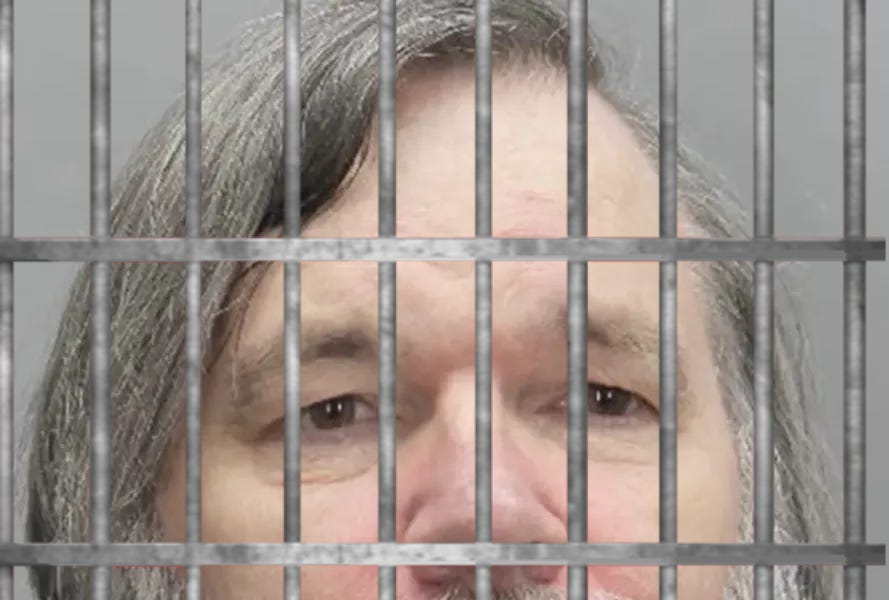
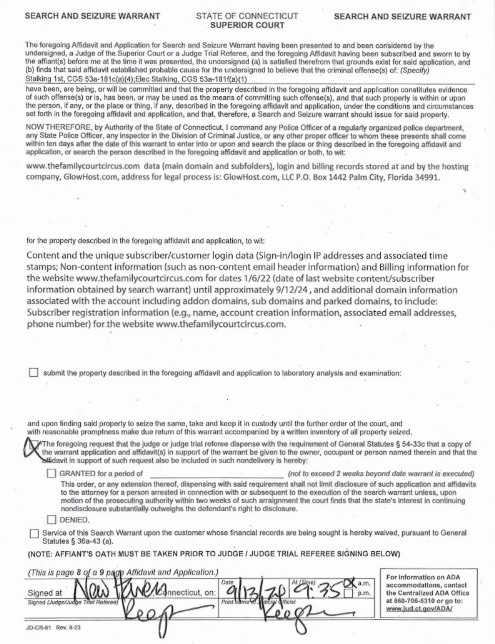
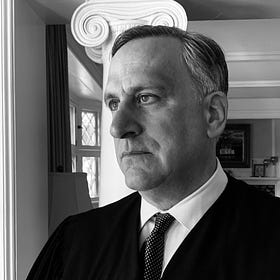
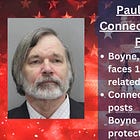
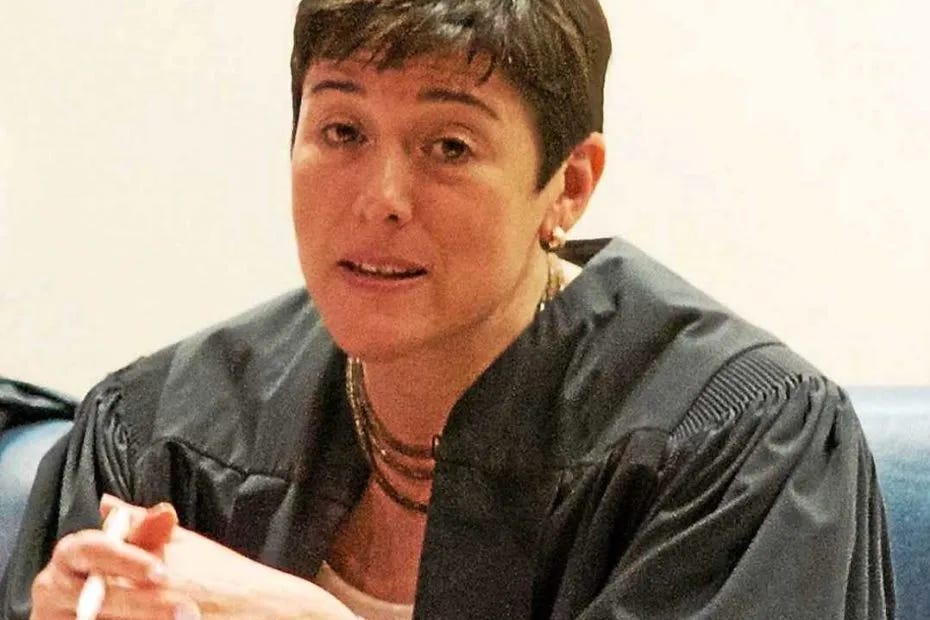
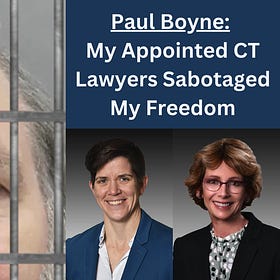

















Connecticut Seeks Web Records in Paul Boyne Case as Prosecution Stumbles